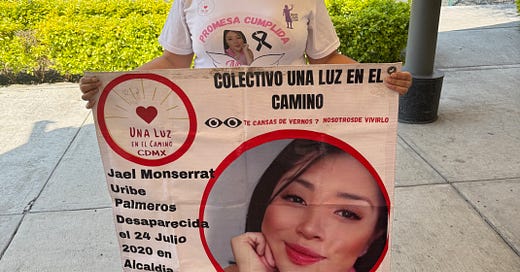At the height of the COVID-19 pandemic, in July 2020, Jael Monserrat Vriloe Palmeros vanished from a Mexico City worker’s residence tied to a local call center. She was a young mother with dreams, swallowed by the darkness of Mexico’s vast crisis of disappearances.
“Montserrat was an artistic child. She was religious. She believed in God. Friendship was important to her,” her mother, Jacqueline, tells me. “She always wanted to be kind to others, never to hurt people.”
When Jacqueline lost contact with her daughter, she turned to the police. Their response was chillingly routine: no help unless she could pay. As a single mother of four, she had nothing to offer. Like so many mothers in Mexico, Jacqueline had no choice but to search alone.
Bit by bit, she pieced together a motive behind Montserrat’s disappearance. A so-called friend had coaxed her into running errands that day, assuring her that her boyfriend would pick her up. What she didn’t know was that Montserrat’s new boyfriend—and the couple who had quickly inserted themselves into her life—were all allegedly part of an organized sex trafficking ring.
Weeks later came the searing message. An anonymous Facebook account. A few words that shattered her world.



